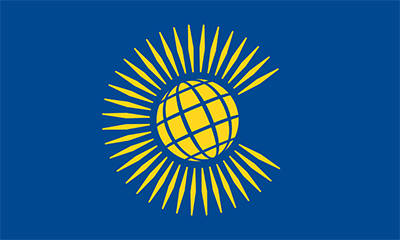The Commonwealth of Nations
The Commonwealth of Nations is a 56-member body that has members from all over the world. Among the common bonds of the member states are that they all at one point or another were part of the British Empire. 
The Commonwealth of Nations had its origins in the British Empire, presided over by a number of monarchs, most notably Queen Victoria. Indeed, the 1887 Colonial Conference, which took place in conjunction with the queen's Golden Jubilee, laid the groundwork for a peaceful splintering of the Empire into a kingdom and its colonies, dependent and self-governing. It was the South African soldier and later political leader Jan Smuts who coined the term "British Commonwealth of Nations," in 1917. The idea took hold and informed a number of decisions at the 1926 Imperial Conference, among them the Balfour Declaration, declaring that the United Kingdom and its dominions were not so much parent-and-child as equals, allies, part of something larger. An official proclamation of this idea came in the 1931 Statue of Westminster, to which prominent former colonies assented in subsequent years. The British Empire did not last past World War II. Most possessions went their separate ways to a greater or lesser degree. Gaining independence prominently was India, throwing off the British Raj in 1947. A handful of former colonies have gained independence but not joined the Commonwealth. These include Aden (now part of the Republic of Yemen), Bahrain, British Somaliland (now the Somali Republic), Burma (now Myanmar), Egypt, Iraq, Kuwait, Oman, Qatar, Sudan, and the United Arab Emirates. The Commonwealth banned South Africa in 1961 because of the country's racial apartheid. After the country's multiracial elections in 1994, South African gained readmittance into the Commonwealth. The nominal head of the Commonwealth is the monarch of the United Kingdom. For the vast majority of the Commonwealth's existence, that monarch was Queen Elizabeth II. Her death in September 2022 brought her oldest son to the throne as King Charles III. Although he was not automatically the next head of the Commonwealth, the members had voted in 2018 to accept him as such when his mother died. The majority of Commonwealth members are republics, run by elected governments (with some appointees). The U.K. monarch is head of state for some members, however. Every two years occurs the Commonwealth Heads of Government Meeting. The location is a city in one of the member states, and the leader of that state is head of the one-week meeting for the entirety of that week. The main entity running things is the Commonwealth Secretariat, which was set up in 1965. The secretary-general is the head of the Secretariat and gets the job by being elected by the Commonwealth heads of state to serve a four-year term (with a limit of two terms). Two deputy secretary-generals support the top person. In 1971, at the first meeting of the Commonwealth Heads of Government, came the Singapore Declaration, which laid out the principles under which the Commonwealth would operate. Among the points of emphasis are the promotion of economic cooperation, individual liberty, world peace, and general equality. The following are members of the Commonwealth (and includes the year joined):
The Commonwealth acts in the collective interest in a number of ways:
As well, the Commonwealth oversees dozens of collective security organizations in the fields of agriculture, architecture, engineering, geography and meteorology, language and literature, media, social work, sports, and veterinary science. 
One of the most visible manifestations of the Commonwealth is the quadrennial Commonwealth Games, which offer competition to the member states' athletes in nearly two dozen events. The first similar event took place in 1930 and was known as the British Empire Games. The name changed to the British Empire and Commonwealth Games in 1954 and again in 1970 to the British Commonwealth Games. From 1978, the events have been known as simply the Commonwealth Games. Member states have taken turns as the host nation for these athletic gatherings. The Games, under their various names, have taken place in these locations:
As in the Olympics, Commonwealth Games participants win medals for the top three performances. Australia is a clear first in total medals won and in gold medals won, followed by England and then, distantly, Canada. |
|
Social Studies for Kids
copyright 2002–2026
David White



 An economic development program provides a trade network and funding avenues for the smaller-size states, which make up the majority of the members.
An economic development program provides a trade network and funding avenues for the smaller-size states, which make up the majority of the members.
